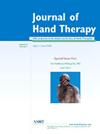Exploring the barriers and enablers to the standardized and routine use of patient-rated outcomes for clients presenting with hand injuries at an Australian public hospital
IF 1.8
4区 医学
Q2 ORTHOPEDICS
引用次数: 0
Abstract
Background
The utilization of standardized patient-rated outcome measures (PROMs) by hand therapists is essential to evaluate treatment and clinical outcomes and underpins evidence-based and patient-centered practice. However, research indicates that the routine use of PROMs is inconsistent in clinical practice.
Purpose
To explore the barriers and enablers experienced by hand therapists in the routine use of standardized and valid PROMs. Additionally, it aimed to describe appropriate strategies, based on the barriers and enablers identified, to improve the administration of PROMs in hand therapy practice.
Study Design
Qualitative.
Methods
Semistructured interviews were used to explore the experiences of hand therapists in routinely using PROMs in clinical practice at two Australian tertiary public hospital hand clinics. Qualitative data were analyzed for themes using reflexive thematic analysis described by Braun and Clarke.
Results
Ten participants were interviewed. Interview findings generated three core themes—Culture is King, It’s All Too Hard and When I do it, I value it. The core themes—Culture is King and It’s All Too Hard reflected the cultural and institutional factors that present as barriers to the routine uptake of standardized PROMs, such as lack of infrastructure to support data collection and a lack of knowledge of PROMs. The third core theme, “When I do it, I value it” reflects the value and importance of completing PROMs to facilitate evidence-based practice and benefits in tracking treatment progress and providing feedback regarding their progression. Suggested strategies for addressing barriers included using appropriate and standardized methods of collecting and storing PROM data, improving accessibility to PROMs in clinical practice and forming peer education groups and training opportunities.
Conclusions
Hand therapists identify the value and importance of completing PROMs in daily practice; however, culture in the workplace and organizational infrastructure adversely influence the routine use of standardized PROMs by hand therapists.
在澳大利亚一家公立医院,为手部受伤的客户探索标准化和常规使用患者评分结果的障碍和促进因素。
背景:手工治疗师使用标准化的患者评价结果测量(PROMs)对评估治疗和临床结果至关重要,并支持循证和以患者为中心的实践。然而,研究表明,PROMs的常规使用在临床实践中是不一致的。目的:探讨手疗师在常规使用规范有效的PROMs时遇到的障碍和促进因素。此外,它旨在描述适当的策略,基于所确定的障碍和使能因素,以改善手治疗实践中PROMs的管理。研究设计:定性。方法:采用半结构式访谈法,探讨澳大利亚两所三级公立医院手科诊所手治疗师在临床实践中常规使用PROMs的经验。使用Braun和Clarke描述的反身性主位分析对主题进行定性数据分析。结果:访谈10名参与者。采访结果产生了三个核心主题——文化为王、这一切都太难了、当我这样做的时候,我很重视它。核心主题“文化为王”和“It’s All Too Hard”反映了文化和制度因素,这些因素阻碍了标准化prom的常规采用,例如缺乏支持数据收集的基础设施和缺乏prom知识。第三个核心主题“当我做的时候,我重视它”反映了完成prom的价值和重要性,以促进循证实践,并在跟踪治疗进展和提供有关其进展的反馈方面获益。建议的解决障碍的战略包括使用适当和标准化的方法收集和存储PROM数据,改善临床实践中PROM的可及性,以及组建同伴教育小组和培训机会。结论:手部治疗师认识到在日常实践中完成PROMs的价值和重要性;然而,工作场所的文化和组织基础设施对手部治疗师常规使用标准化PROMs产生了不利影响。
本文章由计算机程序翻译,如有差异,请以英文原文为准。
求助全文
约1分钟内获得全文
求助全文
来源期刊

Journal of Hand Therapy
医学-外科
CiteScore
3.50
自引率
10.00%
发文量
65
审稿时长
19.2 weeks
期刊介绍:
The Journal of Hand Therapy is designed for hand therapists, occupational and physical therapists, and other hand specialists involved in the rehabilitation of disabling hand problems. The Journal functions as a source of education and information by publishing scientific and clinical articles. Regular features include original reports, clinical reviews, case studies, editorials, and book reviews.
 求助内容:
求助内容: 应助结果提醒方式:
应助结果提醒方式:


